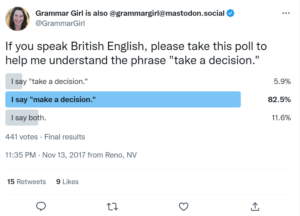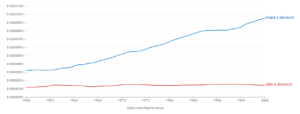In a recent podcast, I talked about some differences between British and American English, and I read a listener comment from an American who lived abroad for several years and noticed that British friends said “take a decision” instead of “make a decision,” but then I got a lot of feedback from British people who said they never say or hear “take a decision.” So I did a Twitter poll to try to get more information. (Audio for that podcast is in the upper right corner of the “dead idioms” page.)
Results of a Twitter poll showing that only 17% of British speaker say take a decision
First, only 17% of British respondents said they use “take a decision.” Six percent appear to use “take” exclusively, and 11% say they use both “take a decision” and “make a decision.” Most Brits—83%—said they would say they “make a decision,” so that explains why a lot of people responded that “take a decision” wasn’t British—it’s definitely a minority of British speakers who say it.
Second, a Google Ngram search also shows that although “take a decision” is more common in British English, “make a decision” is by far the more common phrase in both British and American English.
‘Take a Decision’: American English
A Google Ngram chart showing that Americans don’t use take a decision
‘Take a Decision’: British English
A Google Ngram chart showing that British writers use make a decision more than take a decision
‘Took a Decision’ or ‘Made a Decision’
A couple of interesting things came up in the comments though. Multiple people said that although they say they “make decision,” when they’re using the past tense, they say they “took a decision” instead of they “made a decision.” Since my poll only asked about the present tense options, it didn’t get to this point, so the results could be under-representing take-ness versus make-ness.
‘Take a Decision’: Foreign Language Parallels
Further, many people mentioned that in their native language, the parallel phrase to “make a decision” is “take a decision.” I heard from a French speaker (prendre une décision), Castilian speaker (tomar una decisión), Swedish speaker, Italian speaker (prendere una decisione), and a Portuguese speaker (tomar uma decisão). So it may be that people who are native speakers from a language that uses “take” and are speaking English as a second language are more likely to say they “take a decision” since it’s the way they’re used to thinking about the phrase.
‘Take a Decison’: Not New in American English
For what it’s worth, this isn’t a new distinction. In a 1989 “On Language” column in the “New York Times,” William Safire replied to a reader who wrote in bemoaning that the Britishism “take a decision” was becoming more common in America, and even back then, Safire’s response was that “take a decision” was not as new in America as it seemed to the reader. He had a letter from an American colonel from 1951 that used the phrase.
‘Take a Decision’ and ‘Make a Decision’: Different Meanings?
Finally, some sources speculate that there is a subtle difference between taking a decision and making a decision, in that making a decision refers more to the process and is something that takes time, and taking a decision is the act of deciding and something that happens in an instant.







